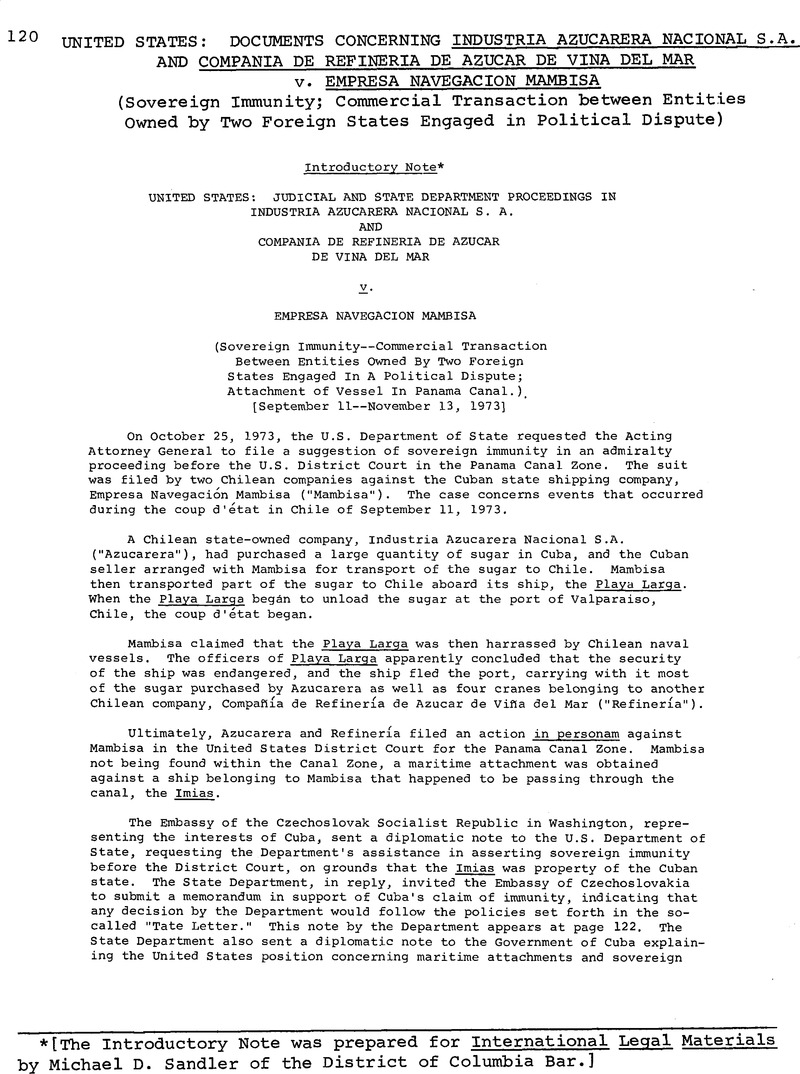No CrossRef data available.
Published online by Cambridge University Press: 04 April 2017

* [The Introductory Note was prepared for International Legal Materials by Michael D. Sandler of the District of Columbia Bar.]
* [Reprinted from the text provided to International Legal Materials.]
* [Reprinted from the text provided to International Legal Materials.]
1 From that Law, and other documentary evidence which is available, the general features of CORFO are apparent. Briefly put, CORFO is a Chilean public entity charged with the responsibility of planning and promoting the systematic development of industry and agriculture in Chile. Pursuant to that responsibility, CORFO formulates and implements development plans. It forms “state enterprises” pursuant to those plans and the plaintiff herein is presumably one of those enterprises. CORFO’s Executive Council is composed overwhelmingly of high-ranking government officials sitting ex–officio and persons appointed by the President of the Republic. It receives Chilean Congressional appropriations totaling approximately fifty (50%) percent of its annual revenue; the other sources of its revenues are the returns of the investments and loans made originally from funds appropriated by Congress, a statutory proportion of certain taxes and various commissions and fees.
The plaintiff Compania de Refineria de Azucar de Vina del Mar appears, as well, to be a wholly–owned state enterprise of the Republic of Chile. It alleges it is the owner of four cranes used to discharge cargo which were on the PLAYA LARGA when the ship departed from Chile and sues for the value thereof.
2 The view adopted by the State Department in this regard is consistent with its prior practice. See, for example, F.W. Stone Engineering Co. v. Petroleos Mexicanos, D.F., 352 Pa. 12, 42 A.2d 57 (1945); U.S. of Mexico v. Schmuck, 294 N.Y. 265, 62 N.E.2d 64 (1945). It is consistent, as well, with other authority. See A.L.I., Restatement 2d, Foreign Relations Law of the Unite States, § 66; Amkor Corp. v. Bank of Korea. 298 F.Supp. 143 (S.D.N.Y. 1969); In Re Investiqation of World Arrangements, 13 F.R.D. 280 (D.D.C. 1962).
3 See, for example, Lauterpacht, “The Problems of Jurisdictional Immunities of Foreign States,” 28 Brit. Y. B. Int’l. L. 220, 225–226 (1951); Fitzmaurice, “State Immunity from Proceedings in Foreign Courts,” 14 Brit. Y. B. Int’l. L. 101, 123–127 (1933).
4 For the reasons stated, sovereign immunity should be suggested in the instant actions whether or not the controversy falls within the standards posited by the court in Victory Transport, Inc. v. Comisaria General, supra. However, it is to be noted that judicial resolution of the instant actions would require determination of “acts concerning the armed forces,” id., at 360, that is, the actions of the armed forces of the Republic of Chile and the Cuban response thereto. Judicial resolution would, further, require determination of “acts concerning diplomatic activity,” id., at 360, that is, the political attitudes of the Republic of Chile and the Republic of Cuba toward one another and actions taken in furtherance thereof.
5 See also New York and Cuba Mail Steamship Co. v. Republic of Korea, 132 F. Supp. 684 (S.D.N.Y. 1955); Et Ve Balik Kurumu v. B.N.S. Inf’1. Sales Corp., 25 Misc. 2d 299, 204 N.Y.S.2d 971 (Sup. Ct., N.Y. Co. 1960), aff’d. 17 A.D. 2d 929, 233 N.Y.S. 2d 1013 (1st Dept. 1962); Weilamann v. Chase Manhattan Bank. 21 Misc. 2d 1086, 192 N.Y.S. 2d 469 (Sup. Ct., Westchester Co. 1959).
6 See also New York and Cuban Steamship Co. v. Republic of Korea, supra; Et Ve Balik Kurumu v. B.N.S. Int’l. Sales Corp., supra; Weilamann v. Chase Manhattan Bank, supra; Lowenfeld, Claims Against Foreign States — A Proposal for Reform, 44 N.Y.U.L. Rev. 901, 926–7 (1969); Bishop, New United States Policy Limiting Sovereign Immunity, 37 Am. J. Int’l. Law 93 (1953).
* Counsel have been informed that a request for a suggestion of immunity may also be submitted on behalf of the vessel “Marble islands,” for which a writ of attachment issued in the United States District Court for the District of the Canal Zone in a related action. That vessel departed from the Canal Zone, however, in defiance of the writ of the United States Court. Since any possible claim of immunity with respect to that vessel is at present a moot question, the issue is not considered in this memorandum.
* Although the Exchange case is often cited as the foundation of the “absolute” doctrine of sovereign immunity, it is important to note that Chief Justice Marshall repeatedly stressed in that opinion that the case involved “public armed ships which constitute a part of the military force of the [foreign] nation.” 11 U.S. at 143. Government participation in commercial trade was not so common or widespread as now, but nonetheless Marshall stated that “when merchant vessels enter for the purposes of trade, it would be obviously inconvenient and dangerous to society, and would subject the laws to continual infraction, and the government to degradation, if such… merchants… were not amenable to the jurisdiction of the country.” Id. at 144.
* [Reprinted from an informal translation provided to International Legal Materials.]
* [Reprinted from the text provided to International Legal Materials.]
* [Reprinted from the text provided to International Legal Materials.]
* [Reproduced from the text provided by the U.S. Department of State. The note will appear in Chapter 6, Section 7, of the Digest of the U.S. Practice in International Law – 1973.]
* [Reproduced from the Official Journal of the European Communities, Vol. 16, No. C 112 (December 20, 1973).]